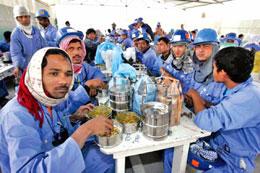Kuwaiti ban useless without ‘Kafala’ reform

Tens of thousands of jobs await Filipinos around the world, including in Canada, for the Southeast Asian nation’s migrant workforce affected by a total Kuwait deployment ban
The official urged would-be applicants to try their luck in the UK, Hong Kong, Canada, Japan, Australia, New Zealand and the US, citing verified job offers from these countries.
He said the UK is seeking 16,000 nurses; Hong Kong wants 154,000 Filipina nannies while Canada needs hundreds of welders.
Japan and S. Korea need thousands of engineers while Taiwan, Brunei, New Zealand and the Czech Republic need over 1,000 labourers immediately.
A list of approved job offers was made available on March 9 — after the entries were vetted by the country's diplomatic posts overseas and the Philippine Overseas Employment Administration (POEA), the country's job regulator.
"We have alternative markets and they (OFWs) can use their experience in Kuwait to their advantage," Jocelyn Sanchez, deputy administrator of POEA, told Manila's GMA News in Tagalog.
According to the Coalition of Licensed Agencies for Domestic and Service Workers (CLADS), the deployment ban in Kuwait has affected 10,000 skilled workers.
Philippine President Rodrigo Duterte is under pressure to better protect the country’s millions of overseas workers after the body of a Filipina was discovered dead in a freezer in a Kuwait City apartment on February 6.
Joanna Daniela Demafelis, 29, was first declared missing by her Lebanese and Syrian employers in November last year. Bearing signs of torture, Demafelis’ body had sustained stab wounds to her neck. Her remains were flown back to the Philippines and received by her grieving family on February 16.
Demafelis’ murder, however, is not in isolation. Faced with seven other deaths of overseas Filipino workers (OFWs) in Kuwait, the Philippine Department of Labor and Employment (DOLE) had ordered a temporary ban on new Filipinos working in the Gulf nation on January 19.
DOLE is still investigating the circumstances of the deaths of the seven Filipino household services workers, namely Vanessa Karissha Esguerra, Devine Riche Encarnacion, Patrick Sunga, Liezl Truz Hukdong, Mira Luna Juntilla, Marie Fe Saliling Librada, and Arlene Castillo Manzano.
On February 12, Duterte responded by issuing a total ban on migrant workers being sent to Kuwait. With populist panache, he asked Gulf states broadly, “Can I ask you now just to treat my countrymen as human beings with dignity? I do not want to fight with you. We need your help to improve our country.”
According to official statistics, more than half of OFWs worldwide are employed in the Middle East, a rich source of the remittances that help to fuel the Philippine economy. The World Bank and Global Knowledge Partnership on Migration and Development ranked the Philippines as the third largest recipient nation of remittances worldwide, trailing only China and India.
Duterte appealed to the country’s legions of OFWs on the campaign trail, promising to ease their processing times and tackle fraudulent agencies that often act as de facto human trafficking rackets.
Once in office, he has established an Overseas Filipino Bank dedicated to providing OFWs banking services and even promised to establish a government ‘Department of OFWs’ in a speech to migrant workers during an April 2017 visit to Bahrain.
Not all of those populist promises, however, have been kept. Duterte has come under criticism for failing to protect OFWs in Southeast Asia, despite the passage of a non-mandatory consensus on the protection and promotion of migrant worker rights during his leadership of the Asean grouping last year. He had billed the measure as the “centerpiece” of his tenure.
Human Rights Watch (HRW), a US-based rights lobby, has argued that the Philippines should instead “work with Kuwait to protect workers rather than ban them from migrating, which is more likely to cause harm than to help.”
HRW maintained that the Philippine government should instead focus efforts on reforming Gulf states’ kafala system – which requires migrant workers to have a sponsor who is responsible for their visas and legal status – to free OFWs from abusive work conditions.
HRW said the system prohibits “workers from leaving or changing jobs without their employers’ consent.” Regina Spöttl, an expert at Amnesty International, another global rights group, said that “through the sponsor law, they [migrant workers] are at the mercy of their employers.”
Migrant-Rights.org, a cause-oriented organization that seeks to promote the rights of migrant workers in the Middle East, contends that sending countries need to fully comprehend how the kafala system works and that it often ties workers to “difficult or impossible situations, including conditions that amount to forced labor.”
Without reform of the kafala system, currently in operation in Lebanon, Bahrain, Iraq, Jordan, Oman, Qatar, Saudi Arabia and the United Arab Emirates, all home to large communities of OFWs, labor rights activists view Duterte’s kneejerk ban on deployments to Kuwait as more grandstanding than reform.
“What is the use of a deployment ban, if this will not lead to the essential reforms in policy and practice in Kuwait and other destination countries?,” said Rex Verona, East and Southeast Asia coordinator at Migrant Forum for Asia, a labor rights group.
Ellene Sana, executive director for the Center for Migrant Advocacy (CMA), echoed that view. She notes that similar temporary bans imposed on destination countries such as Lebanon, Libya and Iraq proved unsuccessful mainly because the “Workers still went there. Workers will go to where the jobs are.”
Duterte has not made any announcements on whether his government feels the need to reform the kafala system to guarantee OFWs’ security and rights in Gulf nations. It would no doubt be a tricky negotiation with rich host nations reluctant to yield the control they now hold over migrant workers.






